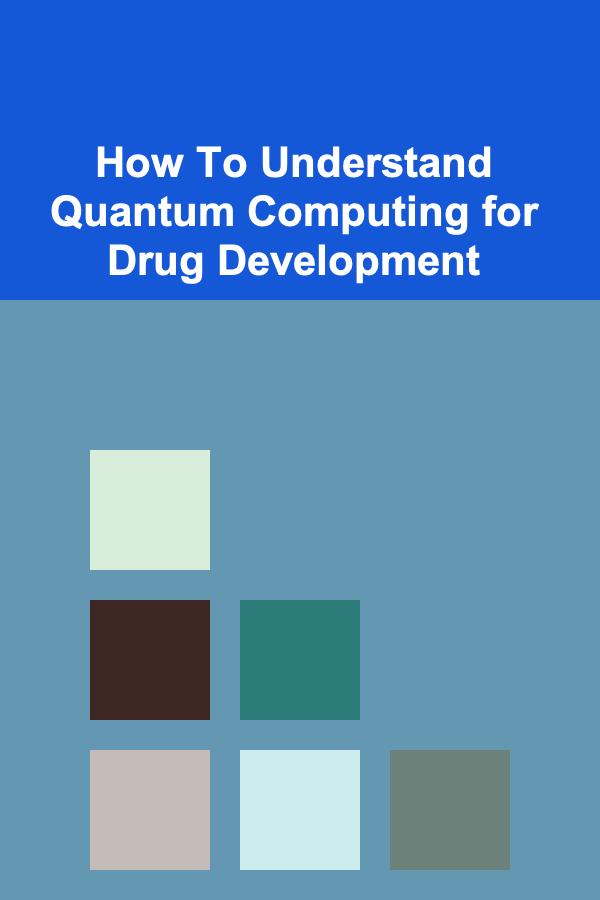
How To Understand Quantum Computing for Drug Development
ebook include PDF & Audio bundle (Micro Guide)
$12.99$5.99
Limited Time Offer! Order within the next:

Quantum computing is an area of technology that promises to revolutionize various industries, with its potential applications in fields such as cryptography, material science, and drug development. In recent years, quantum computing has generated significant interest in the pharmaceutical industry, particularly in drug discovery and development. With the ability to process vast amounts of data and simulate complex biological systems, quantum computers could vastly accelerate the process of finding new medicines and therapies. In this article, we will explore the basics of quantum computing, its applications in drug development, and the challenges and opportunities it presents in the pharmaceutical industry.
What is Quantum Computing?
At its core, quantum computing is a type of computing that uses the principles of quantum mechanics to perform computations. Unlike classical computers, which use bits to store data as either a 0 or 1, quantum computers use quantum bits, or qubits. Qubits can exist in multiple states simultaneously, thanks to a property known as superposition. This allows quantum computers to process an exponentially larger amount of information in parallel compared to classical computers.
Additionally, quantum computers exploit another property of quantum mechanics called entanglement. When qubits are entangled, the state of one qubit becomes correlated with the state of another, no matter the distance between them. This property can potentially be used to perform computations that would be impossible or impractical on classical systems.
Quantum computing holds immense potential for solving certain complex problems much faster and more efficiently than classical computing. However, it's important to note that quantum computers are still in the early stages of development, and many technical hurdles remain before they can reach their full potential.
Quantum Computing and Drug Development
Drug development is a complex and time-consuming process. It involves a series of stages, from the initial discovery of a potential drug candidate to preclinical and clinical testing, regulatory approval, and ultimately, market launch. Drug discovery itself is particularly challenging because it requires a deep understanding of how drugs interact with biological systems at the molecular and atomic levels.
Traditional methods of drug development often involve trial-and-error approaches, where researchers test a wide range of compounds to see which ones show promise in terms of efficacy and safety. This process is not only costly but also time-consuming, with many drugs failing in later stages of testing due to unforeseen side effects or lack of effectiveness.
Quantum computing promises to accelerate drug development by enabling researchers to simulate complex molecular interactions with high accuracy. By harnessing the power of quantum mechanics, researchers could potentially gain deeper insights into biological processes, leading to faster and more targeted drug discovery.
1. Drug Discovery and Molecular Simulations
One of the primary applications of quantum computing in drug development is in the area of molecular simulations. Classical computers are often limited in their ability to accurately simulate molecular interactions, especially when dealing with large, complex molecules like proteins or nucleic acids. These interactions are governed by the laws of quantum mechanics, which classical computers struggle to model accurately.
Quantum computers, on the other hand, are well-suited for simulating quantum systems due to their inherent ability to represent quantum states. They can potentially simulate molecular structures, reactions, and interactions with much higher precision than classical systems. This could significantly reduce the time and cost involved in discovering new drug candidates.
For example, quantum computers could simulate how a drug molecule binds to a target protein, which is a critical step in drug development. In classical computing, this process involves approximations and simplifications, but with quantum computing, researchers could theoretically model these interactions at a much more granular level. This would not only improve the accuracy of drug discovery but also allow researchers to explore a wider range of potential compounds, increasing the likelihood of finding effective drugs.
2. Protein Folding and Structure Prediction
Protein folding is another crucial aspect of drug development, as the shape of a protein determines its function. Misfolded proteins are often associated with diseases such as Alzheimer's and Parkinson's, making the ability to predict protein structures vital for designing therapeutic interventions.
Quantum computers could potentially enhance the accuracy of protein folding simulations, helping researchers to understand how proteins fold and misfold in greater detail. By simulating the quantum states of amino acids in a protein chain, quantum computers could provide more precise predictions of the final folded structure. This, in turn, would allow scientists to design drugs that target specific protein conformations, potentially leading to more effective treatments for protein-related diseases.
3. Optimization of Drug Molecules
Once a promising drug candidate has been identified, the next step in drug development is optimization. This process involves modifying the chemical structure of the molecule to improve its efficacy, stability, and safety profile. Traditionally, drug optimization is an iterative process that relies on trial-and-error, with researchers testing different variations of a compound to see which one performs best.
Quantum computing could transform this process by enabling researchers to explore a vast number of possible molecular configurations much more quickly and accurately. By using quantum algorithms to optimize the interactions between atoms in a drug molecule, researchers could identify the most promising candidates with fewer iterations, reducing both the time and cost of drug development.
4. Simulating Biological Systems
In addition to simulating individual molecules, quantum computers could also be used to simulate entire biological systems. The human body is an incredibly complex system, and understanding how drugs interact with different biological pathways is essential for predicting their effectiveness and safety. Quantum computing could help simulate the behavior of cells, tissues, and organs, providing valuable insights into how drugs will perform in the human body.
For example, quantum computers could simulate the way a drug affects gene expression or how it interacts with the immune system. These simulations could be used to predict side effects, optimize dosage regimens, and identify potential drug-drug interactions before clinical trials begin. This would not only streamline the drug development process but also reduce the risk of adverse reactions in patients.
Challenges of Quantum Computing in Drug Development
While the potential of quantum computing in drug development is immense, there are still significant challenges that need to be addressed before it can be fully integrated into the pharmaceutical industry. Some of these challenges include:
1. Quantum Hardware Limitations
Currently, quantum computers are still in the experimental phase, and most existing quantum computers are not yet powerful enough to handle the complex simulations required for drug development. The number of qubits in most quantum computers is still relatively small, and the error rates associated with quantum computations are high. This makes it difficult to achieve the level of precision required for real-world drug discovery applications.
Additionally, quantum computers are highly sensitive to environmental noise, which can interfere with the quantum states of qubits. This noise can lead to errors in calculations, making it challenging to rely on quantum computers for practical applications in drug development.
2. Algorithm Development
Quantum computing is still in its infancy, and many of the algorithms needed to perform complex simulations in drug development have yet to be developed. While there are some promising quantum algorithms for simulating molecular systems, they are still in the early stages of development and may not yet be efficient enough for large-scale drug discovery applications.
Developing algorithms that can scale with the increasing complexity of drug development is a major challenge. Researchers will need to create new quantum algorithms that are specifically designed to simulate the interactions of large biological systems and molecular compounds.
3. Integration with Classical Computing
Even once quantum computers become more powerful, it is unlikely that they will completely replace classical computers in drug development. Instead, quantum computers are expected to work in tandem with classical systems, where classical computers handle tasks that are well-suited to their strengths, such as data storage and analysis, while quantum computers focus on complex simulations.
This hybrid approach will require the development of new software and interfaces that allow for seamless integration between quantum and classical systems. Researchers will need to learn how to efficiently allocate tasks between the two types of computers, ensuring that each system is used to its full potential.
4. Ethical and Regulatory Considerations
As with any new technology, the use of quantum computing in drug development raises ethical and regulatory concerns. For example, how should the pharmaceutical industry handle the vast amounts of data generated by quantum simulations? What safeguards should be put in place to protect patient privacy? How can quantum computing be used responsibly in drug development to avoid harmful side effects or unintended consequences?
Regulatory bodies will need to establish new frameworks for evaluating the safety and efficacy of drugs developed using quantum simulations. This will require collaboration between quantum computing experts, pharmaceutical companies, and regulators to ensure that quantum-powered drug development is both safe and effective.
Conclusion
Quantum computing has the potential to revolutionize drug development by enabling more accurate simulations, accelerating the discovery of new drug candidates, and optimizing the drug development process. While quantum computing is still in its early stages, the progress made so far is promising, and it is clear that this technology could play a crucial role in the future of pharmaceutical research.
As the field of quantum computing continues to evolve, it will be essential for the pharmaceutical industry to stay informed and adapt to the new possibilities that quantum computing offers. By leveraging this technology, researchers could unlock new levels of understanding in drug discovery and development, ultimately leading to the creation of safer, more effective therapies for a wide range of diseases.

Becoming a Successful E-Learning Specialist: Essential Skills for Digital Education
Read More
How to Improve Your Home's Curb Appeal with Regular Maintenance
Read More
How to Incorporate Yoga into Your Mindful Living
Read More
How to Take Advantage of Rebates and Incentives for Big Discounts
Read More
Monetizing Deep Learning: Creating AI Tools for Ongoing Revenue
Read More10 Tips for Tracking Daily Expenses as a Freelancer
Read MoreOther Products

Becoming a Successful E-Learning Specialist: Essential Skills for Digital Education
Read More
How to Improve Your Home's Curb Appeal with Regular Maintenance
Read More
How to Incorporate Yoga into Your Mindful Living
Read More
How to Take Advantage of Rebates and Incentives for Big Discounts
Read More